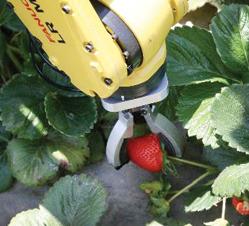May 19, 2015 –  When I’m pulling a carrot out of the garden or eating at the newest farm-to-table restaurant, technology is the furthest thing from my mind. I’m thinking about food, hungry for a direct connection between the earth and my plate. With interest in the back-to-basics, DIY culture at an all time high, it is easy to forget that today’s fast climate of technology has lots to do with our food.
When I’m pulling a carrot out of the garden or eating at the newest farm-to-table restaurant, technology is the furthest thing from my mind. I’m thinking about food, hungry for a direct connection between the earth and my plate. With interest in the back-to-basics, DIY culture at an all time high, it is easy to forget that today’s fast climate of technology has lots to do with our food.
It is evident in the latest POS system at your local bar or signing your signature on a screen at the farmers market. But technology is also addressing some very big issues within food, like feeding our rapidly growing population, reducing food waste and using new methods to cook with alternative energy.
The Salinas Valley is primed for tapping into this technology. Drought, conservation and food waste are some serious issues that can be solved with “smart farm” innovations, like robotic harvesters or fertilizer made from otherwise wasted supermarket discards. This region has never been more ready to see these modern advancements, and there are companies all over the globe working hard at these new ideas. However, there has been a challenge connecting the dots, in parting the “lettuce curtain” between the Salinas Valley and Silicon Valley.
John Hartnett, founder and CEO of SVG Partners in Los Gatos, is working hard to bridge that gap. He spoke at the Monterey Bay Aquarium’s Sustainable Foods Institute last week, an intensive two-day conference for food journalists to hear from experts in a diverse range of fields working towards sustainability. Three years ago, Hartnett’s investment and advisory firm was contacted by the then mayor of Salinas, Dennis Donohue, to aid in solving the epic job loss that occurred when Capital One shut down, impacting 850 families. Hartnett had never before set foot in Salinas. “We live an hour apart, but we might as well be across the planet,” he said, referring again to that “lettuce curtain” that has created a social, economic and environmental barrier.
Hartnett recognized that the Salinas Valley had many similarities to the other Valley over the hill. The climate, fertile soil, proximity to major research and technology hubs, all of this creates a “golden triangle” of opportunity for the area. And so what initially started as a question about job growth has turned into a much larger vision to address the major challenges facing Salinas Valley, culminating in the Steinbeck Innovation Foundation.
Serving as a cluster of four key components; innovation, incubation, investment and corporate engagement, the Foundation has raised $1.5 million so far, working to enhance collaboration between farmers and technology in a variety of ways. There’s the CoderDojo educational program, a partnership with Hartnell College that offers free computer-coding training to 8-17 year olds, many of whom are the children of people working in the fields. And there is the Steinbeck Country Wine Forum, bringing local vintners and growers together to build a regional brand.
But the biggest development that the Steinbeck Innovation Foundation has launched is the Thrive Accelerator Program, a mentorship that pairs Salinas Valley farms with a select few, vetted out global tech companies working on solutions for today’s unique and pressing agriculture challenges. With projections that the world’s food production will need to increase by 70% to feed 9 billion people by 2050, and due to the global reach that the Thrive Program has, the world is taking notice. Major companies are investing in and working with the Steinbeck Foundation, such as Forbes and Verizon, while Taylor Farms and the Western Growers Association are catalyzing the work close to home by advocating with big voices to the local farmers.
In a very exciting announcement last year, Forbes magazine will be bringing their “Reinventing America” series to the Salinas Valley this July 8-10 for the “Forbes Reinventing America: The AgTech Summit”. Hartnett says that by approaching Forbes with an appeal that “the most important part of our world is food,” this partnership will surely “put us on the map, it’s really about telling the story.” The series has garnered a wide audience, and this invitation-only event, bringing together leaders in technology and agriculture, is expected to spark international attention.
About the author
Amber Turpin is a freelance food and travel writer based in the Santa Cruz Mountains.
- Amber Turpinhttps://www.ediblemontereybay.com/author/aturpin/
- Amber Turpinhttps://www.ediblemontereybay.com/author/aturpin/
- Amber Turpinhttps://www.ediblemontereybay.com/author/aturpin/
- Amber Turpinhttps://www.ediblemontereybay.com/author/aturpin/


